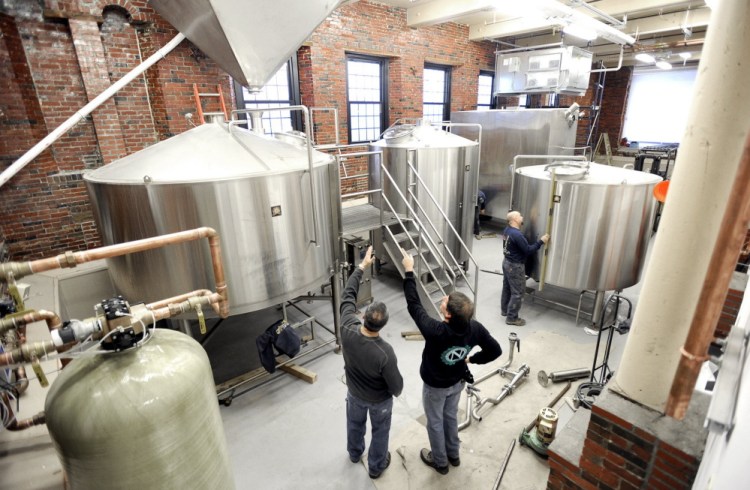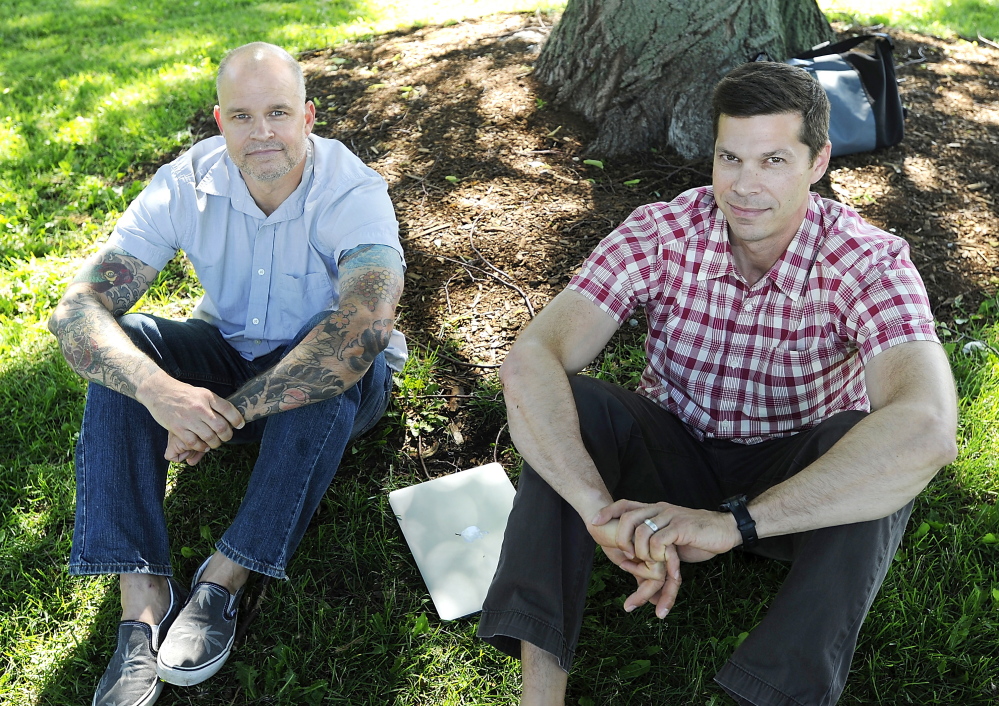John Rooks wants to put himself out of a job. That would be the ideal outcome of his latest initiative, he said.
Rooks is the founder of The SOAP Group, a 12-year-old consulting firm in Portland that helps companies large and small improve their operations and cut costs by reducing waste and their environmental impact.
His experience as a consultant has convinced him that there must be an easier way. Although large companies have the budgets and dedicated staffs to invest hundreds of thousands of dollars on custom-built software to help them track such things as water and electricity usage, carbon emissions and waste, small businesses often don’t and are forced to make do with “archaic” technology, like Excel spreadsheets.
So Rooks began researching the market potential, put together a team and spent the last year building a technology startup, Rapport.
The company recently began offering a cloud-based software platform to allow small and midsized businesses to easily collect and track their own sustainability metrics, from water usage to the number of commuter miles their employees drive each day. There are cost savings that companies can realize through these efforts, but Rooks said other business trends – specifically the pressure that large companies like Wal-Mart put on smaller companies in their supply chain to track these things – are creating a multibillion-dollar market for Rapport’s product.
Just as QuickBooks delivered easy-to-use accounting software to the masses, Rapport will “democratize sustainability” for millions of businesses, Rooks said.
Others in the industry see the potential.
“I think this is a huge untapped opportunity,” said Joel Makower, who has spent the past 25 years as a writer, speaker and entrepreneur in the field of sustainable business. “Their timing couldn’t be better.”
Makower had never heard of Rapport before being contacted by the Portland Press Herald. He said the market has been ready for such a product for a long time, but no one had been able to make it work.
“Bringing small and midsized businesses into the fold has been a long and elusive goal,” said Makower, who is also chairman and executive editor of GreenBiz Group Inc., author of the annual State of Green Business report. “It’s one of the Holy Grails of sustainable business.”
CUTTING COST OF BEER-MAKING
Rapport’s first client, Baxter Brewing in Lewiston, is still discovering ways to use the software to save money and reduce the company’s environmental footprint. Luke Livingston, Baxter’s founder, hired Rooks and The SOAP Group in 2013 to help the company become more sustainable as it initiated a $2 million expansion.
The software’s most tangible result is reflected in Baxter’s water usage. Among U.S. breweries, it takes an average of seven gallons of water to make a single gallon of beer. Baxter, by tweaking its brewing operations and investing a few thousand dollars in a water chiller, was able to reduce its water usage to a point where it now uses only 4.2 gallons of water for every gallon of beer.
“The benefit there is, in addition to saving water and saving the Earth, it’s saving money,” Livingston said. “We obviously pay the city of Lewiston for all the water we use, whether it goes into our beer or down the drain. If we use less water, we pay less money.”
Baxter is proving correct the popular adage: “What doesn’t get measured, doesn’t get managed.” Had Baxter never taken the time or effort to actually track its water use, the potential for lowering its water bill would never have been realized.
“Once we were able to figure out and identify the problem, then we could talk about ways to limit our water,” Livingston said.
Baxter is now using the Rapport platform to track its electricity usage, as well as how much spent grain and hops it’s composting. Livingston knows the platform allows for the tracking of many more metrics, but so far the company’s use of the product has been limited by the amount of time the brewery employees have to input the data. He hopes to expand that.
“It’s a fantastic piece of software that is definitely already proven beneficial to us, both in cost savings and marketability,” Livingston said. “My only hope is to find more time to make better use of it.”
ATTRACTING A LOT OF ATTENTION
Rooks and three co-founders started Rapport in January 2014. Since then, the startup has developed the platform and worked with a small group of beta testers, all of whom had been clients of The SOAP Group.
Rapport only recently emerged from stealth mode, but it has already wracked up a list of successes. In early June, it took home $10,000 as winner of the Top Gun Showcase; it was selected as a semifinalist for the Cleantech Open Northeast, a hybrid program that is both a startup accelerator for companies working in the clean-tech space and a national competition; and recently made the cut to be one of the 26 startups to compete on “Greenlight Maine,” the television show scheduled to debut on WCHS-TV in September, for a grand prize of at least $100,000.
Rooks has taken the attention in stride.
“I think sustainability is a sexy business to be in. It’s kind of a media darling right now,” he said. “I also think in Maine, the combination of a tech startup and a sustainability startup – the intersection of those two things – gets people really excited.”
There is already a $11 billion market for sustainability software, but Justin Jaffe, Rapport’s co-founder and chief operating officer, said it consists almost entirely of “really big companies selling really big software to other really big companies.”
Rapport’s goal is to provide more affordable software to some of the 8 million small and midsized businesses in the country interested in tracking what Rooks calls their “environmental and social health.”
“We’re trying to be as broad as possible and democratize access to these tools,” Jaffe said.
The platform is priced for small budgets. It costs $99 per month per physical site.
Without aggressive marketing, Rapport already has about 30 sites on the platform, about half of which are in the midst of free trials, Rooks said.
The entrepreneurs hope to capture the momentum of larger trends in the business world. Major companies like Wal-Mart, Home Deport, IBM and AT&T have been focused on sustainability efforts for years, but they only have direct control over a small portion of their costs. The rest are buried in their supply chains.
Makower said 80 percent or more of a large company’s environmental footprint lies not in its own facility, but in its supply chain.
“That’s beyond the low-hanging fruit for most of them, so it’s the harder fruit to pick,” Makower said. “So there’s a big push by most big companies, where there’s an opportunity, to engage their supply chains.”
Rooks estimates that perhaps 15 percent of these small to midsized businesses – about 1.2 million companies – are feeling pressure from the large buyers of their products to track and disclose their environmental-impact data.
“This creates a $4 billion opportunity for Rapport,” Rooks said.
Jeff Marks, executive director for the Environmental & Energy Technology Council of Maine, said Rapport’s product is needed right now.
“The market for it can only get stronger as more of these larger companies pull in smaller supply-chain companies to help them achieve their sustainability goals,” Marks said. “Everyone is going green, but having the data to back that up is key.”
OPPORTUNITY FOR ‘VIRAL’ GROWTH
Rooks and his co-founders have boot-strapped the business to this point, along with receiving two seed grants from the Maine Technology Institute worth about $37,500 and a round of angel investment from friends and family. That’s been enough to create a minimum viable product and start attracting customers, Rooks said.
Rooks and Jaffe both expressed confidence that Rapport will be able to grow organically. Jaffe called it the company’s “special sauce.”
Once a company gets on the Rapport platform and begins entering data and tracking various metrics, sharing the platform in order to collect more data from suppliers is easy to do. That could lead to Rapport’s cloud-based platform being shared throughout the supply chain without Rapport having to lift a finger.
“That’s organic growth that’s almost viral in nature and creates a low-cost way to acquire customers,” Rooks said. “If we can deliver on that, we can scale without investment.”
In five years, Rooks envisions Rapport as a large employer of quality high-tech jobs in Portland.
“I want something that can scale for enormous environmental, social and financial impact,” he said. “I think Rapport is going to do that for us. We’re looking to scale this thing and have a cool company that people are clamoring to work for.”
What about his current job and the years of work he spent building his consulting company?
“Part of the strategy is to put The SOAP Group out of business with our software platform,” Rooks said. “I’d be thrilled when that day comes.”
Copy the Story Link
Send questions/comments to the editors.




Success. Please wait for the page to reload. If the page does not reload within 5 seconds, please refresh the page.
Enter your email and password to access comments.
Hi, to comment on stories you must . This profile is in addition to your subscription and website login.
Already have a commenting profile? .
Invalid username/password.
Please check your email to confirm and complete your registration.
Only subscribers are eligible to post comments. Please subscribe or login first for digital access. Here’s why.
Use the form below to reset your password. When you've submitted your account email, we will send an email with a reset code.